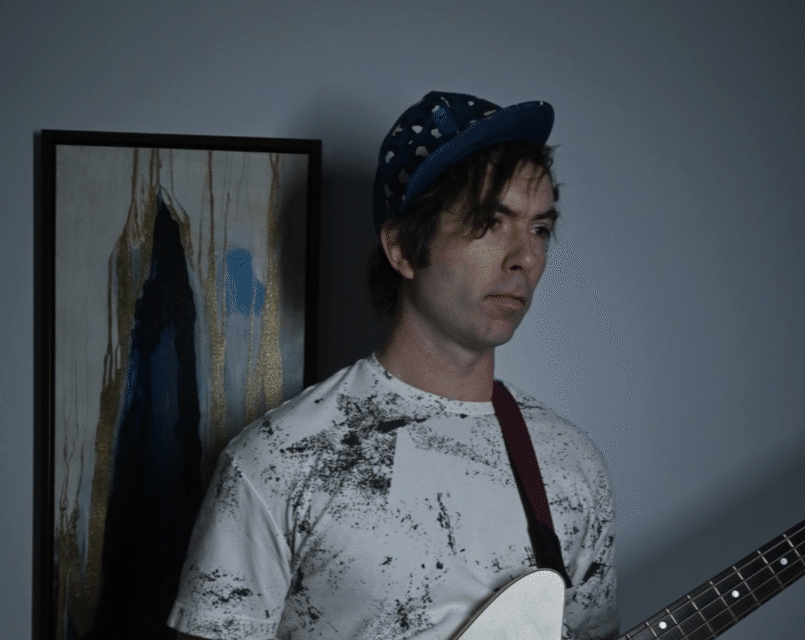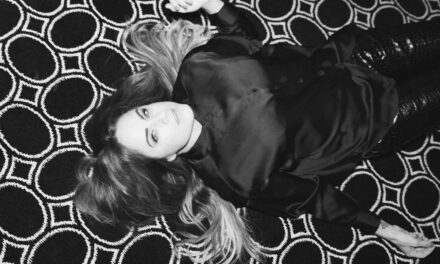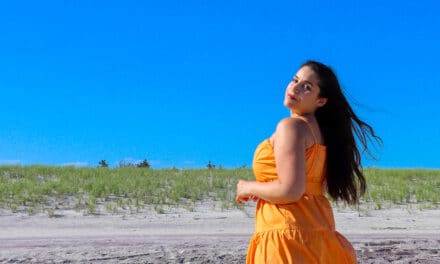If you’ve ever tried to define what exactly SWOLL is, you’ve probably failed. That’s the point.
The Baltimore-based project led by bassist/producer Matt Dowling doesn’t chase genre—it dismantles it, gently and with a pulsing beat. Dowling’s new album, AVOID ATTACH (out September 26), doesn’t just pick apart emotional vulnerability—it turns the psychological condition of avoidant attachment into a living, breathing verb. It’s a disarmingly self-aware look at our digital-age intimacy crisis—delivered through gut-punch basslines, trap percussion, synth-driven shadowplay, and a voice that sounds like it’s seen the inside of a dream you can’t quite remember.
Today, SWOLL dropped “The Wind At Night,” the second single from the upcoming record, along with a visually arresting music video directed by Drew Hagelin, with cinematography by Phy Williams and WLLY. Magnet Magazine premiered it. We’re still catching our breath.
“The Wind At Night” is spectral, hypnotic, and strangely prescient. Dowling tracked the vocals with longtime collaborator Alex Tebeleff in Altadena, Los Angeles, just months before a fire decimated the neighborhood. “At the time, I thought it was about change,” Dowling says. “But now it feels like something else—like it knew something I didn’t.”
It’s that kind of eerie, ambient foresight that defines AVOID ATTACH. It’s not a concept album, exactly, but it feels like one: a slow-building internal monologue about craving connection while running from it, set against an increasingly unreal world. These aren’t heartbreak songs. They’re songs for when your phone is your therapist, your ex is a meme, and your nervous system hasn’t been at baseline since 2020.
Lead single “SCAR” was already a standout—icy and pointed, yet strangely tender. It pays tribute to Puff Pieces’ Bland in D.C., a record that dissected the contradictions of living in America’s political epicenter with dark, chaotic glee. “Scar” channels that same nervous energy through minimalism, tension, and post-punk poetry, making it clear that SWOLL is not here to make background music. This is music that asks you to feel—even if that feeling is disoriented, detached, or vaguely electrified.
And that’s what makes AVOID ATTACH feel so timely. As Dowling puts it, avoidant attachment isn’t just a personal affliction—it’s the vibe. “It’s that push-pull of needing someone and keeping them at arm’s length,” he says. “You see it in dating, in the way we consume media, in how we present ourselves online. We want to be known, but we want control over how—and when—and by whom.”
If that all sounds a little existential, it is. But AVOID ATTACH doesn’t wallow in despair. It pulses. It breathes. It asks questions you don’t expect from an album with trap beats and falsetto vocals. SWOLL has always flirted with genre—Unwound, Kraftwerk, Antelope, Shudder to Think—but this record doesn’t sound like a reference. It sounds like a reckoning.
Tracked in Philadelphia with Dan Angel and Ben Schurr (of Blight Records), mixed by Tebeleff in L.A., and mastered by Sarah Register in Brooklyn, the album itself is a cross-country patchwork of sonic ghosts. It mirrors the fragmented, hyper-geographic lives we lead—DMs from people we’ll never meet in real life, feelings outsourced to playlists, and memories scattered across zip codes.
Live, SWOLL is an entirely different animal. Dowling is joined by Erik Sleight on drums and Zak Forreston on lights, turning each performance into a three-dimensional mood board of sound and vision. It’s music that touches the body as much as the brain—basslines you can feel in your ribcage, visuals that shift like heat lightning.
Having already shared stages with Gang of Four, Moderat, and A Place to Bury Strangers, SWOLL is no stranger to intensity. But AVOID ATTACH feels like a different kind of intimacy—one where every beat is considered, every lyric peeled from the static of the modern condition.
If you’ve ever loved someone too much, too fast—or pulled away just before they could touch the real you—this album’s for you. If you’ve ever felt your phone buzz and your stomach drop—this album’s for you. If you’ve ever stood in the ashes of your own emotional architecture and asked, what now?—you already know the answer.
You listen.
SWOLL — AVOID ATTACH out Sept. 26.
“The Wind At Night” and “SCAR” are streaming now.
Pre-order the album and catch them live:
Tour Dates:
07.26 – Lemoyne, PA @ Consciousness Coffee
08.08 – East Baltimore, MD @ Bogus Gallery
09.06 – New Cumberland, PA @ New Cumberland Music & Film Festival
09.26 – Frederick, MD @ Cafe NoLa
09.27 – Pittsburgh, PA @ The Government Center
10.04 – Raleigh, NC @ Neptune’s
10.18 – Charleston, SC @ Tin Roof
11.04 – Richmond, VA @ The Camel
“Scar” is both a sonic and lyrical homage to Puff Pieces. What drew you to explicitly borrow their lyrics, and how did that decision shape the track’s message?
I felt like I was ripping off Puff Pieces musically, and so much so that I said, “welp, why not just go ahead and use some of their lyrics?” So I got permission from the band (who are also good friends!) and I wrote the song around 3 years ago, when there weren’t so many external reasons to harken back to their record Bland in D.C. – now, coincidentally, a nod back to the message of Bland in D.C. makes total sense. It feels sort of cosmic. That record is also one of my favorite records ever. Go back and listen to that one. They wrong those songs in like 2014-2015, and they could not have been more right about how the political climate in the US was to play out over the following decade.
You describe “avoidant attachment” as a modern condition that inspired the album title. How did you explore this theme emotionally and sonically throughout AVOID ATTACH?
It’s hard to say exactly how I explore it sonically. One way that might come through is eclecticism in music. I’ve always been kind of an eclectic artist with eclectic tastes. But one could argue that an eclectic artist is an avoidantly attached artist. I think a big part of the psychology of avoidant attachment style is not feeling “good enough” for one’s romantic interest. So the period of taking time alone to make art, or music, or whatever, in a relationship is almost like feeling like you’re shielding the other person from what you lack. “Hey, I’m giving them a break from me,” but of course, the other party views it as avoidant, and so it damages the relationship.
Hopping around stylistically as an artist could be a bit of a response to similar internal thoughts about not being good enough, and searching for a new way to be good enough. Like “ugh, can all I can come up with is a 3 chord progression on a guitar? If I were really cool, I’d build all my songs off of tonally wandering glockenspiel riffs.”
What’s interesting about art is that any degree of moral judgment (which is rare to receive) sort of increases the worth of the art. Something that is perceived as “wrong” is simply more interesting to observe and discuss. Of course, in most areas of life, we are very much pushed to NOT be “wrong,” and so these areas swim in kind of an opposite direction of what makes art interesting. A romantic relationship is like a pressure-cooker for assessment and moral judgment, but often very dynamic directionally. Someone can be very attracted to someone they perceive as doing something wrong or being “bad.” Or they could be totally turned off by that same person being “wrong” in a different way. Regardless, at the end of the day, relationships sit somewhere between art and convention, and that makes them weird, but exciting.
SWOLL blends punk, trap, electronic, and post-punk influences. How do you approach genre fusion without losing cohesion in your sound?
Thank you for saying I don’t lose cohesion in my sound! I’m sure many music writers would disagree with you. Like I said, I definitely do have eclectic tastes. My hope is that when music comes out of me, it somehow still sounds like “me.” I think one thing that helps with cohesion in this project is that I never use a whole lot of elements when making the music. It’s always bass, vocals out front, and then drums and synth to fill in a few blanks. That’s it. So, on paper, it is highly at risk of sounding same-y, but my eclecticism pushes it in the other direction. So, ultimately, I think it balances out.
The live show is described as a hybrid sound-sculpture. How do the visual and lighting elements evolve alongside your music?
Well, I recruited Zak Forrest right at the beginning of the project because I wanted a visual element from the start. I just dug what he was doing with lighting art, and convinced him to get involved. I really just let him do his thing, and I think he’s found some interesting new, minimalist ways to make the lighting pop during my sets.
Taking people into a full experience with the live show is important, and maybe that’s part of the eclectic side bubbling up again. The sum of the parts and multiple elements coming together to give people a great live show and visual artistic performance is something we hope resonates.
Much of this album feels politically and socially aware. How do you balance introspection with commentary in your songwriting?
I don’t really consider myself a political artist, and the political environment when I was writing the album was a lot calmer than it is now. I think politics, at its core, is based on psychology, and a lot of my lyrical thinking is about psychology. I think that’s where the intersection comes in. Like the reference back to Puff Pieces, as we interact with the world around us, I can see how part of the psychology of the record could be interpreted through that awareness. I aspire to be politically and socially aware, so I’m happy to hear that the record feels that way to at least some listeners. Though, I always sort of feel behind the curve of what’s really up in new interesting political ideology. Then of course, trying to follow politics and “figure things out” via mainstream media just seems like a pointless waste of time.
You’ve played in bands like Deleted Scenes, The Effects, and Paperhaus. What does SWOLL allow you to express that those projects didn’t?
The big thing really is lyric writing and singing. I was really “just” the bass player for those bands, albeit I tried to serve the songs more than simply showing up to practice and playing root notes. With SWOLL, I really lead the “making” of it, but I must give a lot of credit to Erik Sleight, especially on this record, for bringing a lot of great drumming performance and ideas that made my original ideas a lot more interesting. Overall, there’s certainly a thread between my past projects and what SWOLL does. It’s all kind of a continuum for me.
What was it like collaborating with Ben Schurr, Dan Angel, Alex Tebeleff, and Sarah Register on this record? How did each person contribute to the final sonic identity of *Avoid Attach*?
I’ve collaborated with Ben on really every single SWOLL song to some degree. Most of the key ideas were done before he came into the songs, but he had a ton of tasteful synth ideas that he stream-of-consciousness laid onto the tracks. I’d say the most notable “hell yeah” moment for us is the bridge of “Sunshine (in the Servant).” Dan Angel is just a phenomenal, awesome recording engineer who allows for such a creative ease when you are tracking with him. He played drums on the opening track “The Wind at Night” more or less in one take. Just a joy to record music with.
Alex Tebeleff is a long time friend and bandmate. He was the driving force behind Paperhaus the band and Paperhaus the DIY venue, and I was a big big fan of the community he built with that. We are currently in a bi-coastal music project together called How???, so it feels very natural to bring him in on my recording project. He has a great ear for what makes certain sounds special, and he just “gets” what I want to achieve with recorded music. Hence, it made perfect sense to have him mix the record.
Sarah Register is just a stalwart and you just can’t go wrong with her mastering work. It was a truly lovely experience working with her to polish the record to make it shine. I’ve now been a part of several records that have been mastered by her, and the outcome has always been great.
With references to Unwound, Kraftwerk, and Of Montreal, this project spans decades of influence. What older music continues to shape your current output, and why?
Yeah, I mean, those 3 bands certainly shape what I do. Other older music would be things like David Bowie, The Beatles, Led Zeppelin, This Heat, Fugazi, Neil Young and Blonde Redhead to name a few more.
As music becomes increasingly immersive, what role do you see for live performance art and lighting design in future SWOLL shows?
I dig making the live show a visual experience, and I want to keep building on that. Art is constant exploration, so as long as the audience feels curious and submerged into the experience along with us, then we will just keep exploring and pushing that forward. I imagine doing some version of the light show that is way more simple, and just uses white-light par cans and cool angles.
What do you hope listeners take away from AVOID ATTACH—emotionally, philosophically, or even physically on the dance floor?
First and foremost, I just hope people dig the vibe of the record. To me, I think it feels fairly unique and raw sonically, and I think a lot of that is because it was tracked at Dan Angel’s studio in Philly. I think Philly is a great environment to birth raw music and art, and really is the biggest American city for creative/DIY studio output. It has a ton of studios of many varying types, and there is a cultural comfort with being willing to try new, weird shit in these studios. Not everywhere is like that. It’s a mental landscape and a shift that I hope carries through to anyone who gives a shot to listen.
Lastly, I hope that my lyrical approach encourages people to ask interesting new questions as we enter into the AI age. I’ve heard several people mention how they think AI is going to greatly hinder critical thinking, and I am seeing that wave hit us already. Ask the weird question, try the weird experiment, read the weird old book found in a dusty antique shop, go on a weird road trip without GPS. You’ll get to your destination slower, but you’ll probably find something that no one else will.





